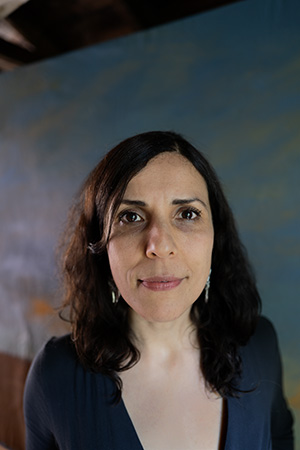Animate and Inevitable: Star Kashi interviews Sadiqa de Meijer

Fiction Editorial Board intern Star Kashi talks with Sadiqa de Meijer, creative nonfiction judge for our 2025 Open Season Awards (accepting entries now). They discuss the textures that belong in your writing, how every retelling is a narrowing, and her upcoming book In the Field.
Sadiqa de Meijer is a poet and essayist whose books include Leaving Howe Island (Governor General's Award Finalist 2014), The Outer Wards (Raymond Souster Award finalist), and alfabet/alphabet (Governor General's Award Winner 2021). Her work, which often explores landscape, language, inner lives, and the long wakes of colonialism and migration, has received the CBC Poetry Prize, Arc's Poem of the Year Award, the Jean Royce Fellowship, and other honours. It has been published internationally in Poetry Magazine, the Walrus, Brick Magazine, Poetry London, and anthologized in The Best Canadian Poetry, The Best Canadian Essays, and the Dutch Turing Prize series. Her essay collection In The Field is forthcoming in 2025. She is currently Poet Laureate of Katarokwi/Kingston.
The creative writing genres are evolving every day as writers experiment with different styles in their writing. We also see this in your recent book alfabet/alphabet, which takes a creative approach to linguistic essays. Considering that, what do you look for in a winning entry this season?
I'm not partial to specific kinds of creative nonfiction—I am interested in reading essays, memoir, and literary journalism, as well as work in less common or traditional forms. What matters to me is that the writing makes the form it takes feel animate and inevitable. And I want reading that accompanies me, that returns and unsettles or comforts or amuses, after I close the page or screen.
In your book, as you write about the transition between Dutch and English, you talk about being between the two languages. As an immigrant myself, going through the same transition right now, I feel the detachment never really leaves; you only learn how to manage it. And it can be disheartening to make comparisons to native speakers. What’s your advice for writers who are going through the same challenges?
I would like people to appreciate that there are multiple Englishes, many of which are inflected with the presence of another language, or several languages. If you're a writer in English, get as comfortable as possible with your instrument: listen to poetry, read good books closely, speak lines out loud, look up any words that are new to you, try them out in conversation. But hold on to your first language(s), and don't attempt to erase their presence in your English. Your migrations, and the histories that gave rise to them, and the cultures that continue through your practices, and the landscapes where they originated, are textures that belong in your writing voice.
The essay collection has quite a tone change compared to your previous works, which are mostly poetry. What or who would you say was the main spark or inspiration to write the book? You also mention a couple of poets in your book. Were they among the primary roles? If so, which one would you say had the most substantial impact on you?
The inspiration for the essays was the question that several people asked me after I wrote my first poetry book, which was how the Dutch language influenced my writing in English. Yes, some of the Dutch poets mentioned in the book include Leo Vroman, Ida Gerhardt, Martinus Nijhoff, Ramsey Nasr, and M. Vasalis. I suppose the works of the first two have held the most significance to me. Vroman in part because his training was in biology, like my own, and he also liked to draw, and I loved hearing him read in person. Gerhardt because I admire her skill—her poems are difficult to translate because their sound and meaning rely on the Dutch language as a clock does on the gears that make it work.
What was your process during writing alfabet/alphabet? Has your writing process changed over the years or between genres? How did it feel?
I took notes towards the book for a few years, whenever I noticed Dutch language influences in my current life. Then I developed those notes into essays. With poetry, there's a different impetus—not usually an idea or thought, but the sound of words, or a particular image, or a pocket in the day that felt mysterious to me. I think the process of writing, in general, occurs for me now with a deeper trust than it did in earlier years. I am okay with leaving digressions on the page, I know that a passage that feels like a dead end might open a few days later, I know that the parts I have to scrap were not a waste to write. Somehow it isn't any easier, and is also less fraught.
Sometimes, it can be challenging to stick to the truth and the whole truth when it comes to writing nonfiction. What motivates you to stay and write for the reality-based side of art and literature? What’s your advice for emerging writers in the cnf field?
Given the nature of memory, and that every retelling is a kind of narrowing as well, even retrospective nonfiction skews what happened. But the world is really interesting! I like to observe it, then read or ask questions, and consider all of that as my material. My advice would be unoriginal and true: to read loads of good writing, to write in exploration of your subject, to revise until each phrase is essential.
Moving on, what are your future plans? Are you currently working on any new work?
Yes, I am working on a collection of essays called In The Field, which will come out with Palimpsest Press in 2025. The title essay appeared in The Malahat Review and you can read a short excerpt here: https://www.malahatreview.ca/excerpts/demeijer.html.

Star Kashi









